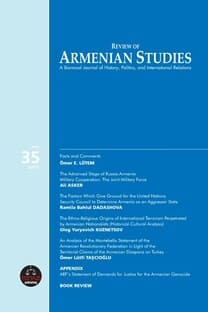DAĞLIK KARABAĞ İHTİLAFI: GECİKTİRİLMİŞ BİR ÇATIŞMA
Bu makalenin amacı Dağlık Karabağ çatışmasının tarihsel arkaplanını tartışmak, müdahil olan tarafların konuya ilişkin tavırlarınıtanımlamak ve sorunu iki farklı analiz-seviyesinde ele almaktadır. İlkanaliz, Kafkasya’daki sistem düzeyinde çatışma boyutunun elealınacağı sistemik bir analiz olacaktır. Bu değerlendirme iki heveslihegemon, yani Birleşik Devletler ve Rusya arasında Kafkasya’dakienerji kaynakları üzerindeki rekabetin Dağlık Karabağ sorunununçözümlenmesini engellediği gösterilecektir. Bu hipotezin temelindekidüşünce, bölgedeki diğer aktörlerin bu güçler ile karşılaştırıldığında güçkapasiteleri sınırlı olduğundan, çatışmanın sistem boyutu bu ülkelerin kesinçözüme müdahil olmasını önlemektedir. Çatışmaya müdahil olan aktörlerindış politika tercihlerini belirleyen yerel sebepleri inceleyecek ikinci analiz,yapısal tercih oluşturma sürecinden farklı alternatif bir süreç oluşumunuortaya koyacaktır. Bu yaklaşım devlet-toplum ilişkilerinin çatışan taraflarıntercihleri ve dış politika seçimlerine etkisini gösterecektir. Böyle bir ikiyönlü çalışma, resmin tamamının görülebilmesi ve tüm ikili ve uluslararasıçabalara rağmen Dağlık Karabağ ihtilafının çözümsüz kalmasınınsebeplerinin anlaşılması açısından gereklidir
Anahtar Kelimeler:
Dağlık Karabağ, İhtilaf Çözümü, Amerika BirleşikDevletleri, Rusya, sistem analizi, dış politika
THE DISPUTE OVER NAGORNO-KARABAKH: A PROTRACTED CONFLICT
The aim of this paper is to discuss the historical backgroundof the Nagorno-Karabakh conflict, to identify the positions of the mainparties involved and to analyze this dispute from two different level-ofanalyses. The first analysis will be a systemic one where the systemlevel conflict dimension in the Caucasus will be investigated. Thisanalysis will demonstrate how the two aspiring hegemons’, namely theUnited States (US) and Russia, rivalry over critical energy resources inthe Caucasus let the Nagorno-Karabakh conflict unresolved. Thereasoning behind this hypothesis is that since other actors in the regionhave quite limited power capabilities vis-à-vis these great powers, thesystemic dimension of the conflict counteracts their involvement to thedefinitive resolution. On the other hand, the second analysis which willexamine the domestic factors determining foreign policy choices of theactors involved in the conflict will provide an alternative preferenceformation process other than the structural one. This approach willpresent the impact of state-society relations on the conflicted actors’preferences and foreign policy choices. Making this kind of a dual studyis a necessity in terms of seeing the complete picture and understandingthe reasons of why the Nagorno-Karabakh conflict remains unresolveddespite all the bilateral and international efforts
Keywords:
Nagorno-Karabakh, Conflict Resolution, United States, Russia, system analysis, foreign policy,
- ISSN: 1303-5304
- Yayın Aralığı: Yılda 2 Sayı
- Başlangıç: 2002
- Yayıncı: Terazi Yayıncılık Basım Dağıtım Danışmanlık Eğitim Organizasyon Matbaacılık Kırtasiye Tic. Ltd. Şti.
Sayıdaki Diğer Makaleler
TÜRK DÜŞMANLIĞI’NIN BİR BAŞKA YÜZÜ: DÜNYA ÜZERİNDEKİ “SOYKIRIM” ANITLARI
France's entanglement in the armenian genocide issue
Notes from the battlefield known as'history'
ERMENİ SOYKIRIMI TEZLERİNİ ELEŞTİREN İLK AMERİKAN AKADEMİK KİTABI
1915 ERMENİ TARTIŞMASINDA GÖZDEN KAÇAN HUSUSLAR
Intra-or international violence? the origins of armenian terrorism
‘TARİH’ OLARAK BİLİNEN SAVAŞ ALANINDAN NOTLAR
An assessment of armenian claims from the perspective of international criminal law
